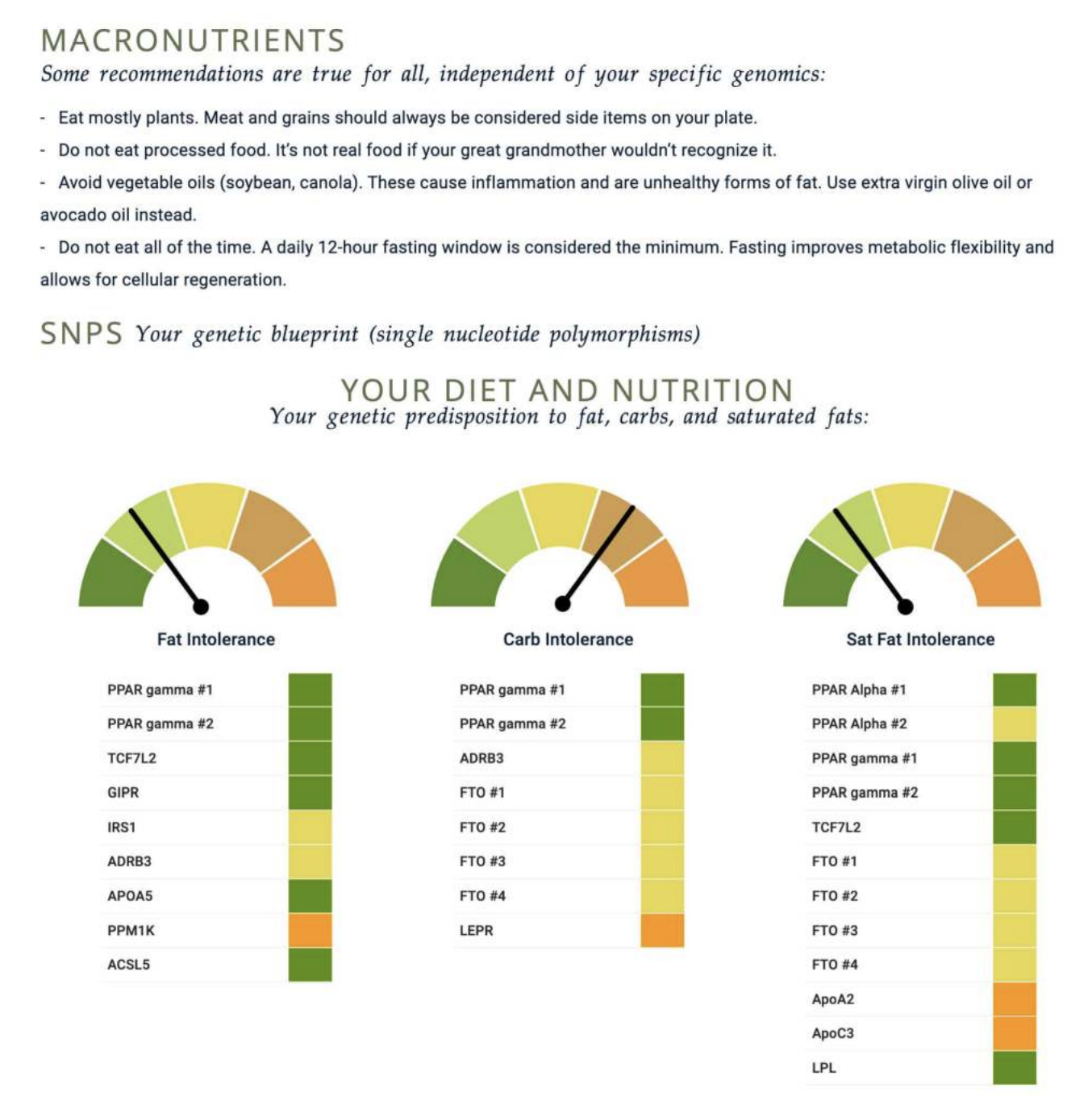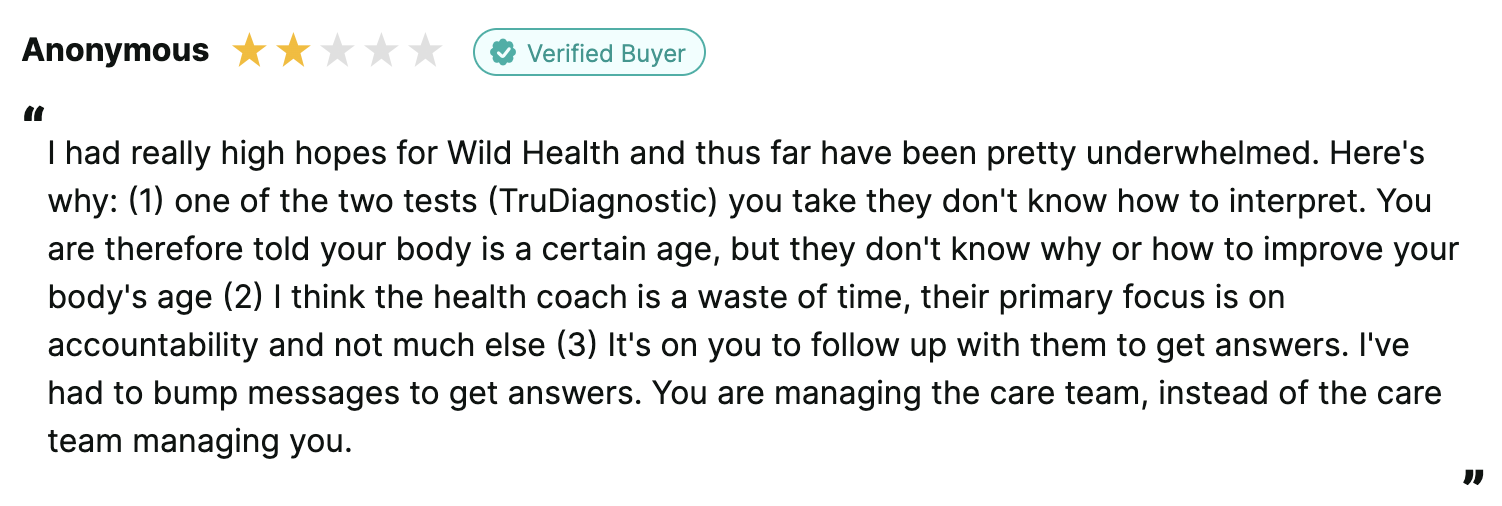
Overview
- Products: Concierge medicine memberships, including genetic testing, lab work, physician visits, health coaching, and epigenetic testing
- Cost: $495/month (Standard) to $25,000+/year (Peak & Elite)
- Reports: Clarity Report, which includes genetics, lab results, and wellness guidance
- Raw data access: Not available
- Privacy: Doesn’t share data
- Alternatives: SelfDecode offers a more comprehensive option, with polygenic risk scores, 1,200+ wellness reports, and AI-powered health recommendations.
Wild Health Pros and Cons
Pros
- Includes access to physicians, lab testing, and health coaching
- Emphasizes proactive care and whole-person wellness
- Offers biological age testing and other advanced assessments
- Practitioner education program available for healthcare providers
Cons
- Very high cost, especially for limited genetic analysis
- Analyzes only a small number of variants, which limits predictive accuracy
- Reports lack depth and actionable insights despite premium positioning
- No raw DNA data access or polygenic risk scoring
- Limited health topic coverage
- Frequent user complaints about delays, vague recommendations, and billing issues
- No practitioner platform for applying insights clinically
About Wild Health
Wild Health is a concierge-style health service that offers genetics-based wellness programs with the goal of extending healthspan and improving overall well-being.
Founded by Dr. Matthew Dawson and Dr. Mike Mallin, both emergency medicine physicians, the company is based in Lexington, Kentucky and has positioned itself as an alternative to traditional healthcare.
Review of Wild Health Reports & Services
As interest in personalized health continues to grow, more companies are offering genetic and lab-based reports to help individuals make informed decisions about their wellness. One such provider is Wild Health.
In this review, we’ll take a closer look at the depth, accuracy, and practical value of their services to help readers make an informed decision when choosing between health optimization platforms.
Review of Wild Health Clarity Report
The Wild Health Clarity report aims to offer a personalized approach to health by combining genetic insights with lab data in an accessible, easy-to-read format. It introduces some important concepts around macronutrient metabolism and methylation and makes an effort to tailor suggestions based on an individual’s DNA and biomarkers.
While the report does include some individualized guidance, a deeper analysis reveals several limitations in terms of depth, comprehensiveness, and actionable recommendations. Many of the insights rely on just one or two SNPs, which makes the recommendations scientifically weak.
For a detailed walkthrough of Wild Health’s report, watch this in-depth review that breaks down the findings and their implications:
One of the most striking limitations is the number of genetic markers analyzed. Across all sections, the report references approximately 35 SNPs, primarily related to macronutrient metabolism and methylation. While these are relevant areas, the genetic analysis is neither comprehensive nor particularly detailed.
Common SNPs such as FTO, PPARG, and MTHFR are included, but there’s little explanation of how these genes interact, no genotype-level detail, and no scoring to indicate the weight or strength of each result. The approach is piecemeal, presenting isolated data points instead of holistic insights.
In contrast, SelfDecode analyzes over 200 million SNPs and uses advanced AI to calculate polygenic risk scores, giving users a far more accurate and nuanced understanding of their genetic predispositions.
The health topics covered in the Clarity report are also quite limited. The bulk of the report focuses on macronutrient ratios, saturated fat and carbohydrate tolerance, and basic methylation function.
There is no coverage of other key areas such as inflammation, hormones, sleep, cognition, fitness, immune function, or detox pathways, categories that are critical to a holistic understanding of one’s health.
SelfDecode, by comparison, offers over 1,200 detailed wellness reports covering every major system in the body and provides personalized recommendations tailored to each user’s unique genetic profile.
Although the Wild Health report attempts to integrate lab data with genetic findings by referencing markers like fasting glucose, cholesterol, homocysteine, B12, and TMAO, the integration tends to be surface-level.
Lab results are listed without much context, optimal range comparisons, or clear interpretation. For example, despite a “borderline” methylation status and multiple risk alleles in the MTHFR and PEMT genes, the report offers minimal actionable guidance tied directly to those findings. It fails to bring together lab results, genetic data, and environmental factors into a single cohesive recommendation.
The scientific rigor of the Clarity report also leaves room for improvement. Only two studies are cited, and the descriptions of genetic mechanisms are oversimplified.
Important topics like gene-gene interactions, environmental influences, and epigenetics are completely absent. While the simplified format may help general readers understand the content, it lacks the sophistication needed to guide real health decisions.
While Wild Health does include a handful of recommendations that may be based on the user’s profile, many default to widely accepted health tips such as eating more plants or avoiding vegetable oils. This level of advice, while not inherently wrong, doesn’t reflect the depth of personalization that many users expect from a DNA-based health service.
Other Products and Services
Beyond the Clarity report, Wild Health offers a range of services intended to support their personalized health programs. These services are designed to offer a more holistic, data-driven view of individual health and include the following components:
Medical Intake
Wild Health begins with a comprehensive onboarding process that includes family history, lifestyle data, a medical intake, and lab work. This is positioned as the foundation for building a personalized health plan.
Lab Testing
Quarterly lab panels track biomarkers over time and are interpreted against “optimal” rather than conventional ranges. While this can offer greater sensitivity, the labs included are relatively standard, and the Clarity report itself provides limited context or actionable guidance based on the results.
Multiple reviews mention that while test results are delivered, follow-up explanations are often vague or delayed, with care teams sometimes unable to clarify how to apply the results in a meaningful way.
Physician Visits
Wild Health emphasizes regular physician touchpoints, offering quarterly visits in some plans and unlimited visits in higher tiers. While this frequency may lead to better care outcomes, it also significantly increases the cost of membership.
User feedback also suggests that these appointments are often short and feel rushed, with limited time to explore test results or tailor treatment plans. Additionally, some members report long wait times to book appointments, which can delay care.
Health Coaching
Members are paired with accredited health coaches who help implement care plans and offer ongoing support. While health coaching can be valuable, the recommendations observed in the report are often generic, which may limit the coach’s ability to provide individualized guidance.
Some users also noted that coaching sessions lacked depth and were primarily focused on accountability check-ins, rather than offering new or personalized insights.
Biological Age Testing
Using TruDiagnostic’s TruAge test, Wild Health includes epigenetic testing to assess biological aging. While an interesting data point, the report reviewed did not clearly integrate these results into practical recommendations or ongoing plans for intervention.
In some cases, customers were told their biological age but received no actionable insights on how to improve it, suggesting a lack of training or standardization in interpreting epigenetic data.
Cost of Wild Health
Wild Health offers three tiers of membership-based care, with pricing that reflects a high-touch, concierge-style medical experience.
While their services are positioned as a premium alternative to conventional healthcare, the costs may be prohibitive for many people.
Standard Plan — $495/month or $5,445 annually
The entry-level “Standard” plan includes a genetic analysis, four lab tests, four physician visits, and access to a health coach. It also features biological age testing, a VO2 max test, DEXA scan, and health reports.
Peak Plan — $25,000 annually
The “Peak” membership expands the offering with unlimited physician visits, advanced lab testing, biometric tracking devices, and specialized coaching.
Elite Plan — Price Not Disclosed
At the top tier, the “Elite” program includes all features of the Peak plan plus concierge-level access to your physician and care team, in-person services, and more advanced testing. Pricing is available only upon request, and access is limited to 50 patients per physician.
While these packages are designed to position Wild Health as a comprehensive solution for proactive wellness, the price tags are difficult to justify when weighed against the actual depth of insights provided.
The genetic interpretation is limited, omitting polygenic scores, environmental considerations, and deeper mechanistic context. Lab data is minimally analyzed, and even frequent physician check-ins are only as valuable as the data driving those conversations. For the cost, users may expect more precise, personalized, and actionable support.
Health Recommendations
A central promise of Wild Health’s model is to deliver recommendations tailored to the individual. In practice, however, the recommendations observed in the Clarity report remain relatively basic.
While there is some indication that advice is influenced by genetic and lab data, for example, minor shifts in macronutrient guidance, most suggestions appear broadly applicable. These include:
- Eat mostly plants
- Avoid vegetable oils like soybean and canola
- Use olive oil or avocado oil instead
- Fast for at least 12 hours daily
- Track your macronutrient intake
These recommendations may support general wellness, but they don’t reflect a high level of personalization. There’s no clear linkage between the advice and the user’s unique SNPs or biomarker results. Even in cases where meaningful variants are detected, such as MTHFR or PEMT, the report does not provide gene-specific interventions or supplement suggestions.
This level of generality may also impact the usefulness of frequent physician visits. Without meaningful data interpretation and highly targeted interventions, more physician time doesn’t necessarily equate to better outcomes.
Wild Health for Health Practitioners
Wild Health offers training opportunities for healthcare providers interested in learning more about Precision Medicine, with a focus on genomics-based, personalized care.
The main educational offering is the Fundamentals of Precision Medicine Course, a self-paced, online program priced at $2,995. This course includes 12 modules covering topics such as genomics, chronic disease, health coaching, and longevity. Participants also receive CME accreditation, one year of access to course materials, and entry into a Facebook alumni community.
While this course may appeal to practitioners looking to expand their knowledge of genomics and lifestyle-based care, it’s worth noting that Wild Health does not provide a dedicated practitioner platform or clinical decision support tools to use with clients.
Unlike other platforms tailored to professional use, Wild Health’s services are primarily patient-facing and do not offer features like raw DNA upload, client report generation, or a centralized practitioner dashboard.
Practitioners seeking more robust tools to analyze and act on their clients’ genetic and lab data, such as customizable reports, AI-powered health recommendations, and white-label solutions, may find other platforms, like PromicsEdge, to be better suited for clinical practice.
Wild Health Reviews
Wild Health promotes itself as a premium, personalized healthcare service, but reviews reveal recurring issues with execution, communication, and value.
Many customers were drawn to the idea of tailored care based on DNA and lab data, but several report waiting months for their genetic results, often without updates or clear communication. Some users noted that despite paying for a plan centered on precision medicine, the DNA analysis was never delivered or discussed.
Physician visits received mixed feedback. While doctors were generally well-reviewed, appointments felt rushed and hard to schedule. Some users waited weeks or even months to meet with a physician, which is an issue that felt especially frustrating given the high cost.
Health coaching was another weak spot for some. Although a few appreciated the support, many described the advice as generic or superficial, and said they had to take the lead in managing their care.
Several reviewers also cited serious billing problems, including being charged after cancellation or facing unapproved fee increases. Attempts to resolve these issues often went unanswered, leading to frustration and lost trust.
In short, while the concept of Wild Health is compelling, reviews suggest that the service may fall short in consistency and delivery, especially when weighed against its premium pricing.

Alternatives to Wild Health
While Wild Health may appeal to those seeking a high-touch concierge experience, it’s not the only option for personalized, genetics-based health optimization. For individuals looking for deeper insights, greater affordability, and more scientific rigor, SelfDecode stands out as a powerful alternative.
Unlike Wild Health, which analyzes a limited number of SNPs and offers general lifestyle tips, SelfDecode examines over 200 million genetic variants using advanced AI to calculate polygenic risk scores, providing users with a far more accurate and nuanced picture of their health risks and potential.
SelfDecode offers:
- Analysis of over 100,000 SNPs per report, providing extensive genetic coverage and nuanced risk assessment.
- Integration of DNA, lab results, and lifestyle data to generate dynamic, ancestry-adjusted polygenic risk scores and personalized health recommendations.
- Access to 1,250+ detailed health reports covering a wide range of critical areas such as inflammation, sleep, cognition, cardiovascular health, fitness, detoxification, hormones, and more.
- A robust database of over 20,000 gene-based, evidence-backed recommendations that are continuously updated based on your lab and lifestyle inputs.
- The ability to upload third-party lab data for seamless integration and more accurate health insights.
- DecodyGPT, an AI-powered health assistant that provides personalized, easy-to-understand answers to complex health questions based on your combined genetic and lab data.
- All algorithms and recommendations are supported by more than 100,000 scientific references and validated by published peer-reviewed research.
- The most advanced ancestry-adjusted polygenic risk scores, validated and published in a Nature journal. Read about it here.
| Feature | SelfDecode | Wild Health |
| Genetic Markers Analyzed | 100,000+ SNPs per report, ancestry-adjusted PRS | ~35 SNPs, focused mainly on macronutrient metabolism and methylation |
| Health Report | 1,200+ detailed reports across inflammation, sleep, cognition, cardiovascular, fitness, detox, and more | Limited to basic macronutrient metabolism and methylation |
| Integration with Labs and Lifestyle Data | Yes, dynamic recommendations based on DNA, labs, and lifestyle input | Basic lab integration with limited context |
| Personalized Health Recommendations | 20,000 evidence-based, personalized recommendations | Mostly generic health advice |
| Scientific Rigor | Reports are supported by 100,000 scientific references and peer-reviewed studies | Limited citations, oversimplified genetic explanations |
| Physician Access | Not included, 1:1 health consultations available | Concierge-style physician, but often rushed and hard to schedule, according to reviews |
| AI Assistance | DecodyGPT AI assistant | No AI-driven health assistant |
| User Experience | User-friendly platform with comprehensive data visualization and easy access | Mixed reviews on usability, with reported communication issues and delayed results |
Want to compare for yourself?
Single SNP vs PRS vs Advanced PRS
Wild Health’s genetic analysis relies on a very limited number of SNPs, fewer than 100 across key areas like macronutrient metabolism and methylation. While these single-gene insights can offer some context, research shows that analyzing individual SNPs alone provides minimal predictive power for complex traits. A single SNP rarely produces results that are more accurate than chance, even if it is considered the “most significant” variant.
Polygenic risk scores (PRS), by contrast, aggregate the effects of thousands or millions of genetic variants, offering a far more accurate and meaningful estimate of an individual’s predisposition to complex health conditions. Advanced PRS models further integrate AI, environmental factors, age, sex, and ancestry to refine predictions, providing actionable, evidence-based insights that go beyond what single-SNP analysis can deliver.
In practice, this means that Wild Health’s SNP-based reports may highlight isolated genetic markers but cannot provide a comprehensive or reliable assessment of risk. Users seeking predictive, data-driven health recommendations would benefit from platforms like SelfDecode or PromicsEdge, which leverage full PRS models to integrate multi-omic data and generate personalized guidance. Read more about it here.
Wild Health Review Summary
Wild Health offers a concierge-style health experience with personalized care and genetic insights, but at a steep price. While their approach sounds promising, the genetic analysis is limited, focusing on fewer than 100 SNPs, and many users report generic recommendations and inconsistent communication.
Their practitioner training course provides a basic foundation in Precision Medicine but lacks a robust platform for applying these insights in practice.
For those seeking deeper, more actionable health data at a more accessible price, SelfDecode may be a better fit. It offers comprehensive DNA analysis, AI-powered tools, and thousands of personalized recommendations, all designed to help you make informed health decisions, without the concierge price tag.





